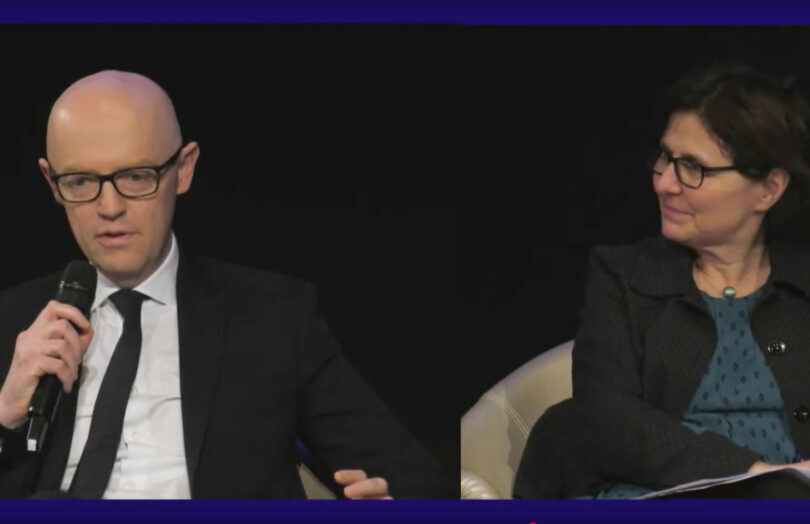Yesterday the Banque de France held an event on the move to T+1 settlement in Europe. Much of the discussion covered tokenization, DLT and the need for a wholesale CBDC. The European Investment Bank (EIB) is the most prolific issuer of digital bonds. Its activities aim to move the innovation needle, so it doesn’t hesitate to outline the issues to be addressed to gain traction.
The EIB finds friction as a digital bond investor
The EIB has issued six digital bonds so far using five different DLT platforms. Last November, during the ECB wholesale DLT settlement trials, the EIB also attempted to become a digital bond investor. EIB Director General of Finance, Cyril Rousseau, said they found it a painful task, and instructive about what needs to happen for tokenization to achieve scale. The process took so long that they only invested in the Slovenian sovereign digital bond four days before it was redeemed. It had a four month term.
As an investor he found a few issues. The digital bonds were not as ‘desirable’ as other securities because they lack features such as secondary market liquidity and the ability to use them for repurchase agreements (repo). Additionally, he sees legal and technology risks. His biggest gripe is that he did not want to have to go through the same process for each digital bond platform.
“Why isn’t it (tokenization) upscaling right now? It’s because we are delivering an asset which is less reliable than the other ones. So I think we need to work on interoperability,” said Mr Rousseau.
He also noted, “We are convinced that we need to have a clear roadmap on where is the Eurosystem is going in terms of CBDC.”
HSBC, Euroclear already address digital bond frictions
In response to the interoperability comments, Euroclear’s Isabelle Delorme noted that a few DLT platforms, including Euroclear’s D-FMI, HSBC’s Orion and SIX’s SDX have adopted a hybrid model by integrating with legacy systems, allowing investors to engage with digital bonds without needing to use the technology directly. This addresses technical integration issues, and the lack of secondary markets and liquidity in the near term.
HSBC’s Orion has hosted two of the EIB digital bonds. John O’Neill from HSBC highlighted that the legacy integration can also support repo usage. We’re aware of digital bonds being used for repo in Hong Kong and Switzerland, with the central banks playing an important role. Beyond repo, he also emphasized the broader potential for tokenization and collateral mobility. We’d add the examples of Eurex and JP Morgan exploring the use of tokenized collateral for margin.
“We’re in danger of thinking none of these things exist anywhere in the world and they might come in a few years time. They exist, and they exist today,” said Mr O’Neill.
In terms of investor appetite for digital bonds, he noted the $750 million Hong Kong digital bond issuance last year had demand for over a billion dollars. It was hosted on the HSBC Orion platform, which was integrated with the local CSD. Likewise, Euroclear’s Delorme said its $300m issuance by AIIB was expanded with an additional $200 million tap, with demand from four continents.
“It was a demonstration that the appetite, at least be front runners, was there,” said Ms Delorme.
She also highlighted many of the benefits of tokenization, including the usage of DLT removing the need for reconciliations by having a golden source, which saves considerable costs.
Tokenization, fragmentation and unified ledgers
Nonetheless, she acknowledged that the fragmentation exists. To address these issues, the panel touched on the concept of a unified ledger and the cross over with an EU capital markets union.
Outside of DLT, she argued that some institutions are more experienced in providing backbone style services, whereas others tend to focus on applications.
“Many of us will offer business applications … use cases on digital assets, and some of us will participate in a backbone. This is life as it is, and the DNA of each of us today,” she said.
“I believe that Euroclear here is ready to contribute, participate, and co-create this kind of a backbone that would help different ledgers, different tokenized assets to be done, traded and shared and settled.”
One could infer a message that CSDs should be running the backbone and banks the applications on top of it. Clearstream, DTCC and Euroclear have published joint frameworks on tokenization.
While that logic is sound, we’ve previously highlighted tensions with this path. For example, DLT reduces the need for a CSD, with laws in Germany and Luxembourg replacing the issuance requirements for a CSD with a registrar or control agent. However, European legislation still requires a CSD for secondary markets.
Hence, CSDs have turf to protect. Another member of the panel was the DTCC’s Ann Shuman. She agreed with the benefits of tokenization, but also highlighted that many business problems, such as T0 settlement can be achieved with existing technology. The DTCC also had their fingers burned with a project (Trade Information Warehouse) in which they put extensive resources into a DLT solution only to find the market wasn’t ready. So regarding tokenization she said, “we believe in that future, we’re just not certain of the timeline.”
Pros and cons of atomic settlement
Given the event was about the move to T+1 the topic of T+0 and DLT for atomic settlement was discussed. There was some conflation between instant and atomic settlement. Atomic settlement involves the simultaneous exchange of cash and securities, delivery versus payment. However, that can be instant – at the time of the trade – or potentially at a future time or date.
Nobody on the panel is seeing demand for instant settlement today.
Multiple panelists raised potential financial stability risks if there were a move to instant settlement, given the demands it places on liquidity. The DTCC’s Ann Shuman noted the massive benefits of netting. On average $2.2 trillion in daily trades in the U.S. are reduced to a settlement figure of around $43 billion.
We’d note that using those same figures, a researcher found that almost all the netting benefits could be achieved over a one hour netting period rather than a day or two days.
Several panelists including from the EIB, Euroclear and HSBC highlighted the need for a wholesale CBDC.
“We haven’t seen issuers electing to issue same day (settlement) on blockchain-based platforms like HSBC Orion at the moment,” said HSBC’s John O’Neill. “And I think that comes back to actually just the challenges of moving money.”












 All while Pfizer—a company with a $2.3 billion criminal fine for fraudulent marketing, bribery, and kickbacks—was given blanket immunity from liability and billions in taxpayer dollars to produce a vaccine in record time with no long-term safety data.
All while Pfizer—a company with a $2.3 billion criminal fine for fraudulent marketing, bribery, and kickbacks—was given blanket immunity from liability and billions in taxpayer dollars to produce a vaccine in record time with no long-term safety data.
























